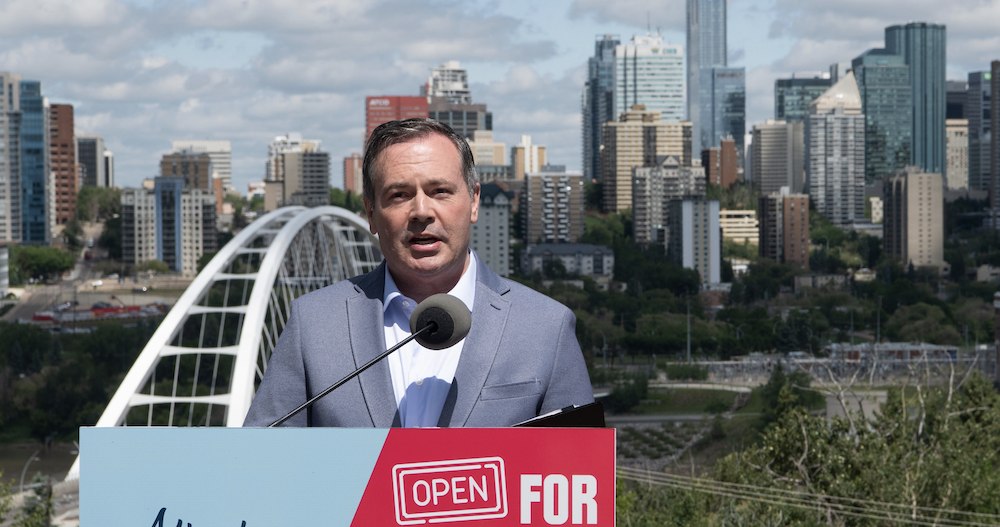Jason Kenney did not seem pleased when the first reporter to ask a question at his June 18 news conference on his COVID-19 reopening plans raised the topic of offensive commentary about residential schools by the Alberta premier’s favourite curriculum advisor, Christian P. Champion.
Champion, a PhD historian who worked as Kenney’s political aide in Ottawa and was hired to play a key role in writing Alberta’s controversial K-to-6 social studies curriculum, seems unable to resist the sophomoric urge to make outrageous statements about Indigenous history that appear intended to provoke the many Canadians who do not share his inflammatory views.
Champion is known for attacking reconciliation with First Nations in Canada as “an ongoing fad,” an exercise in “politics and cashola,” and “agitprop,” as well as pontificating about how “thematic history seems ideally suited to transmitting left-wing dogma” — an opinion apparently shared by Premier Kenney, who acts as if he sees himself a self-taught expert in pedagogy.
Two days before the news conference, the Twitter account for the Dorchester Review, Champion’s self-described “semi-academic” history journal, had published several provocative tweets on the same topic. Their principal purpose appeared to be to goad Canadians upset and angered by the discovery of 215 children’s bodies in unmarked graves at the site of Canada’s largest residential school in Kamloops, B.C.
The tweets, in turn, linked readers to a tendentious and inflammatory article in the publication by Champion himself, which accused activists of equating the Canadian government’s residential schools policy with the Holocaust, compared people who disagree with him to “totalitarian propagandists,” misrepresented the objectives of the Truth and Reconciliation Commission as being to “prevent healing,” and called concern about this tragic chapter of Canadian history “gutter posturing” and “a Big Lie narrative.”
So, when the CBC’s Janet French asked the premier if he shared Champion’s opinion that activists were “exploiting” the discovery to portray Canada falsely as a racist country, Kenney responded sharply with a sour look on his face.
“That individual has not worked on curriculum since October of last year when his contract ended,” he said — irrelevantly, since the curriculum, which the Kenney government is still pushing ahead, is widely viewed by professional educators as deeply flawed, ideologically motivated, and inappropriate for primary school children.
While acknowledging that “the entire system is a black mark on Canadian history” and claiming he does not share Champion’s views, Premier Kenney went on to lecture French about the inappropriateness of comparing anything that has happened in Canadian history to the unique horror of the Holocaust.
This is a fair point as far as it goes, but what the premier failed to mention is that it is Champion who obsessively compares residential schools to the crimes of the Nazi and Soviet regimes as a rhetorical device to diminish and insult Canadians’ profound horror upon learning the history of the residential school system.
It may well be “ridiculous to compare organizations of poor Oblates to machine-gun-toting Einsatzgruppen and Soviet NKVD,” as Champion wrote in what it would be fair to call his right-wing vanity publication, but it’s important to remember that it is principally Champion who is doing the comparing.
And while an argument can be made that “a sense of proportion” is needed in any historical discussion, Champion’s inflammatory rhetoric seems intended to achieve the opposite result.
It is simply not true, as Champion preposterously states as if it were indisputable fact, that “anyone over the age of 40 knows that the term ‘survivor’ was specifically used for ‘Holocaust survivor’.” Nor is the term “cultural genocide” inappropriate, and one doesn’t need to be over 40 to understand that was the obvious intention of the Canadian government’s policy in the 19th Century and into the 20th.
In other words, Champion’s latest fulmination about what he called a “multi-billion-dollar grievance industry” can only be interpreted as a diatribe, intended to provoke.
Under the terrible circumstances so recently revealed, it was entirely appropriate for French to raise Champion’s views in the context of asking her second question, to wit: what feedback would Kenney have to hear to take the social studies curriculum back to the drawing board?
“I appreciate your reading an ATA press release there, Janet,” Kenney responded snippily, referring to the Alberta Teachers Association, as the provincial teachers’ union is known. He went on to make it clear he has every intention of implementing the curriculum.
Given that, opponents of the curriculum are within their rights to continue using Champion as a piñata to thrash of the failings of the UCP government — a role the historian seems to relish even if it is unhelpful to his former boss.
It’s bound to be remembered that Kenney once called Champion’s Dorchester Review “an important new voice that’ll ruffle some feathers, in a good way.”
It seems likely that Champion will come to play the same role for the United Conservative Party’s opponents as did high-profile B.C. environmentalist Tzeporah Berman when Kenney was challenging the NDP government. That is, a stick to beat them with.
Who can forget the way the UCP squealed with outraged delight when the ATA invited Berman to speak to a meeting in the fall of 2018, giving the then-opposition party a chance to attack both teachers and the NDP?
Many NDP insiders came to rue the day the Notley government hired the blunt-spoken and principled Berman to show it was listening to environmentalists as well as industry in the oil patch.
What do you want to bet UCP insiders will come to see Champion in a similar light?
David Climenhaga, author of the Alberta Diary blog, is a journalist, author, journalism teacher, poet and trade union communicator who has worked in senior writing and editing positions at The Globe and Mail and the Calgary Herald.
Image credit: Chris Schwarz, Government of Alberta




